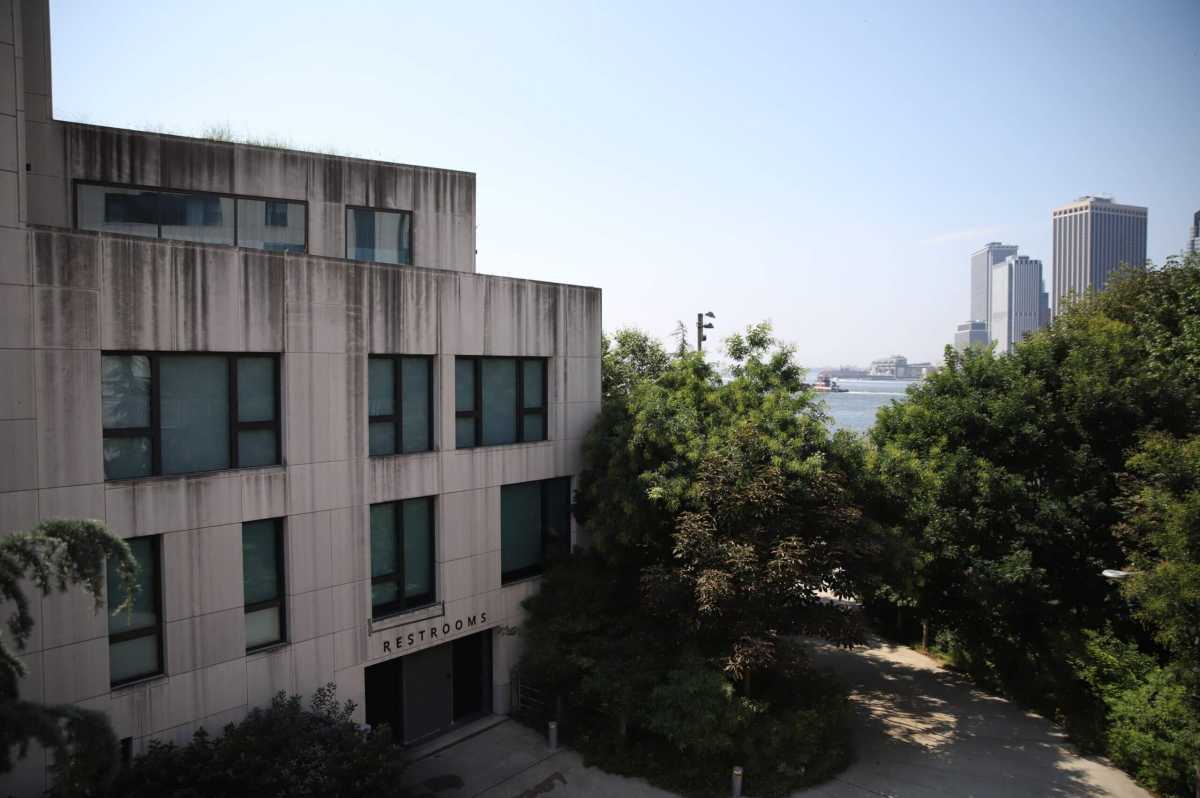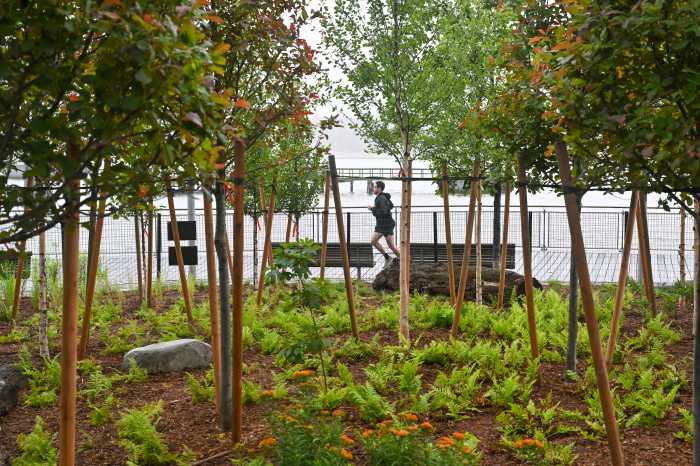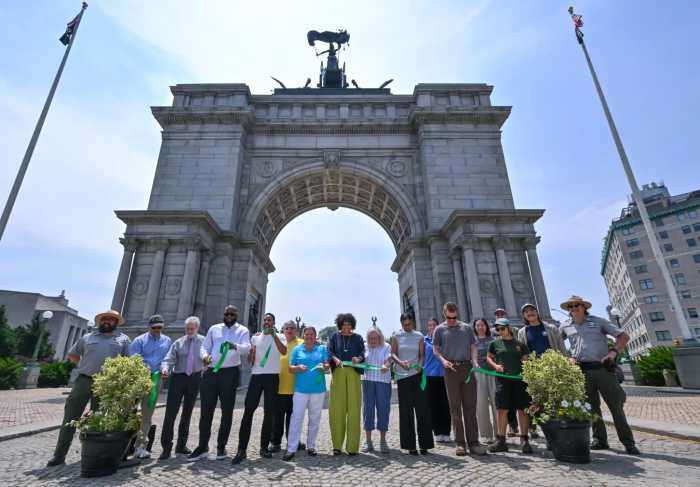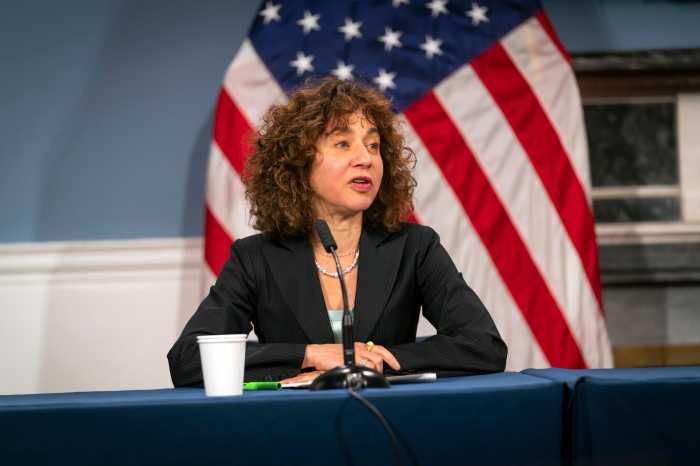This story was originally published on Sept. 11, 2023, by THE CITY. Sign up here to get the latest stories from THE CITY delivered to you each morning.
Living in a condominium situated in Brooklyn Bridge Park, you might expect to hear birds chirping, children playing, the wind rustling through the trees — and the sounds of toilets flushing and hands drying.
The city is now looking into “acoustic renovations” to help make a public bathroom quieter following a years-long legal battle in which the owners of a condo in the park claim the toilets on the first floor of their building are a noisy nightmare.
The cacophony has caused Salim Samaha, his wife Kimberly Su, and their family — including a young child and Su’s elderly mother — to endure nonstop sleepless nights since they bought the nearly $5 million unit in June of 2019, according to a September 2020 lawsuit they filed in Brooklyn Supreme Court. Their complaints began soon after they moved in.
The family “did not have notice of the excessive and frequent noise” from the park-operated bathroom, gate, and storage room beneath their five-bedroom apartment, they allege in the suit.
Brooklyn Bridge Park Corp. has conducted repeated renovations on the allegedly boisterous bathrooms — which opened in 2017 — but it hasn’t done enough to dim the noise, the family alleges.
Now the park’s management is searching for experts to further fix the “bathroom acoustics” of the public restrooms, which are open from around 6 a.m. to 11 p.m. inside the Pierhouse Condominium on Furman Street.
The nonprofit organization that runs the public park last week posted in The City Record that it is “seeking an experienced contractor to perform acoustic renovations to the men’s and women’s public restrooms.”
Eric Landau, the president of Brooklyn Bridge Park Corp., told THE CITY that the organization issued the request to see how much it would cost to do further noise mitigation on the bathrooms — even though the two sides are still in litigation.
“We are trying to find what our options are for rectifying this situation, though do not believe we are violating the New York City noise code or the law,” he said.
“We feel very, very strongly that this is a public bathroom, in a public park, and it remaining open and operational is paramount.”
Flushing Meadows
Meanwhile, the couple shared their tale of water-closet woe in multiple court documents, writing that they can hear every flush from the bathroom below despite extensive renovation work after they first complained.
The flushing creates a “banging” and “water hammer” effect as well as vibrations across their five-bedroom, four-bathroom duplex, they allege. Sounds from the opening and closing of bathroom stalls also comes through their apartment, they said, as well as noise from a clanging gate and workers in a storage room.
The couple hired a sound engineering company, whose testing found that flushing toilets beneath the home violated the city’s noise code, the court papers state.
The firm, SoundSense, found the bathroom noise changed the ambient noise level in the master bedroom by more than what is legally allowed — 7 dB above ambient at night and 10 dB more during the day.
The city’s Department of Environmental Protection, however, countered through its own testing that the noise was not that bad.
“There was no excessive or unreasonable noise (water hammering/flushing from the men and womens restroom facilities) noted or detected at the time of inspection,” inspectors found during a December 2020 visit.
The couple also complained about noise from a nearby MTA ventilation plant and the Brooklyn-Queens Expressway — “particularly when trucks go over a bump on the highway directly outside the residence,” experts from SoundSense wrote.
Samaha told the court in a deposition that it isn’t “unreasonable for the bathroom and storage room to be shut down until the excessive noise conditions are abated,” noting there are four bathrooms within a seven-minute walk from the ones below his apartment.
The couple’s lawyer did not respond to a phone call and email seeking comment.
Private Buildings, Public Good
The first section of the approximately 85-acre Brooklyn Bridge Park opened in 2010 on a once-industrial stretch of former Port Authority property along the East River. It is operated by the Brooklyn Bridge Park Corp., which maintains the park through an agreement with the city.
Private development, including the 108-unit Pierhouse condo, was allowed on the grounds as a way to pay for the park’s maintenance, and the first tenants moved in by 2016.
As part of the development deal, the condo and the nearby 1 Hotel had to have public amenities, like bathrooms, for the park’s many visitors. This year, around 5 million people came to the park between Memorial Day and Labor Day, Landau said.
The buildings have been controversial from the start, with neighbors outside the park filing an unsuccessful lawsuit, saying they ruined the view from the Brooklyn Heights Promenade. Two Brooklyn Bridge Park board members were among the first to buy condos inside the Pierhouse, a potential conflict of interest which had to be approved by the city’s law department.
/cdn.vox-cdn.com/uploads/chorus_asset/file/24907247/image.png)
The current lawsuit is still moving through court, with Samaha’s lawyer alleging the bathroom noise has lowered the value of the family’s apartment. Property records show it was purchased for more than $4.95 million four years ago. According to StreetEasy, the value has gone down 13% since then.
Their toilet fight comes as the City Council released a bill last month that would require the city to create a “long-term citywide bathroom strategy” to ultimately have one public toilet per every 2,000 residents by 2035.
The bill’s sponsor, Councilmember Sandy Nurse (D-Brooklyn), has said that the issue of public restrooms is about equity.
“Because NYC’s lack of public bathrooms disproportionately affects some people more than others!” she posted on social media last month.
THE CITY is an independent, nonprofit news outlet dedicated to hard-hitting reporting that serves the people of New York.



/cdn.vox-cdn.com/uploads/chorus_asset/file/24907248/IMG_8560.JPG)
/cdn.vox-cdn.com/uploads/chorus_asset/file/24907233/IMG_8531.JPG)






















